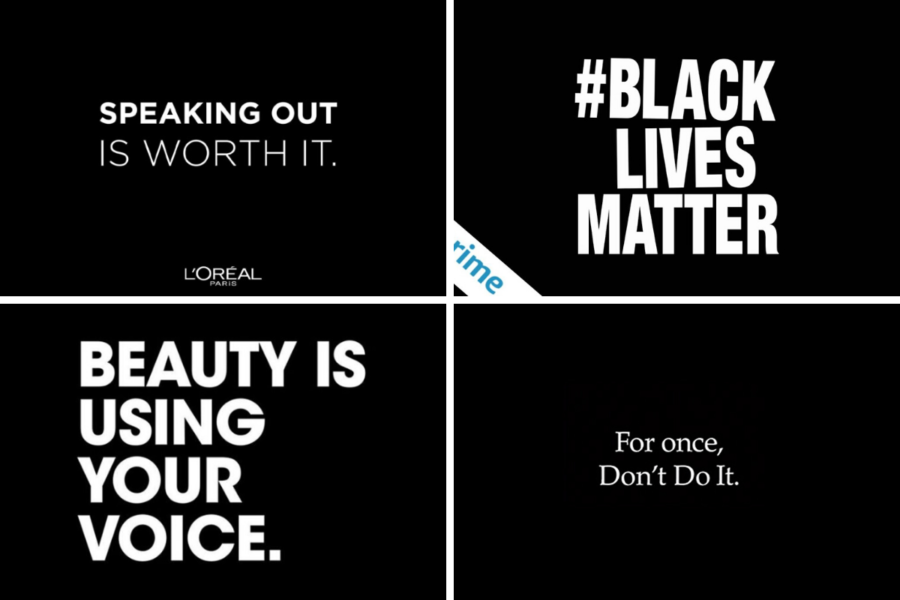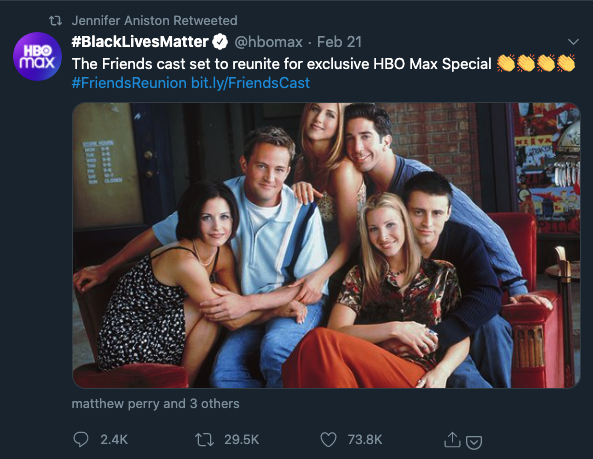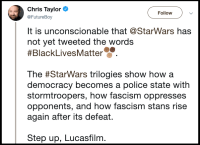
“#BlackLivesMatter,” tweeted Mashable editor Chris Taylor last week. “The #StarWars trilogies show how a democracy becomes a police state with stormtroopers, how fascism oppresses opponents, and how fascism [supporters] rise again after its defeat. Step up, Lucasfilm.”
Taylor, the author of How Star Wars Conquered the Universe: The Past, Present, and Future of a Multibillion Dollar Franchise, eventually deleted the tweet after it became the subject of widespread mockery. But you can see why he thought that Lucasfilm, a cash-cow subsidiary of Walt Disney Studios, might bend to his wishes. Amidst the climate of outrage that has prevailed since the killing of George Floyd by Minneapolis Police officer Derek Chauvin on May 25th, numerous companies have publicly denounced racism and social injustice—often reaping much praise as a result. On May 30th, for instance, Netflix tweeted out “To be silent is to be complicit. Black lives matter. We have a platform, and we have a duty to our Black members, employees, creators and talent to speak up.” It now has more than a million likes.
To be silent is to be complicit.
Black lives matter.We have a platform, and we have a duty to our Black members, employees, creators and talent to speak up.
— Netflix (@netflix) May 30, 2020
During the 20th century, the pursuit of middle American cultural tastes typically required corporations to posture in a bland, conservative way that served to deflect controversy and project “family values.” The rise of the urban liberal as both a dominant market segment and source of skilled labour has changed all that. It is no longer sufficient for a company to simply sell you its widgets; it must also tell you about its grand social purpose, especially as that purpose reflects enlightened attitudes to diversity and inclusion.
 Sometimes, this can lead to unintended hilarity—as with HBO Max changing its Twitter name to “#BlackLivesMatter” just in time for Jennifer Aniston to retweet an old photo of the lily-white cast of Friends. But occasionally, the irony hits a darker note. If it hadn’t been for the current social conflagration, we might never have learned that the Dow Chemical Company believes that when “we see injustice and inequity, we cannot be silent. We must stand up and speak out.” It’s an admirable message, but it comes from a company whose current subsidiary, Union Carbide, was responsible for the 1984 release of a methyl isocyanate gas cloud at a Bhopal, India pesticide plant that left 16,000 dead and about 40,000 others disabled or sick. The plant owner, Union Carbide India Limited, wasn’t controlled by Dow at the time. But the Bhopal tragedy remains history’s deadliest industrial disaster. And it feels strange to see Union Carbide’s corporate successor airily describe its commitment to social justice when the scene of the Bhopal tragedy still hasn’t been cleaned up. To this day, the drinking water in almost two dozen nearby communities is contaminated by toxic solvents.
Sometimes, this can lead to unintended hilarity—as with HBO Max changing its Twitter name to “#BlackLivesMatter” just in time for Jennifer Aniston to retweet an old photo of the lily-white cast of Friends. But occasionally, the irony hits a darker note. If it hadn’t been for the current social conflagration, we might never have learned that the Dow Chemical Company believes that when “we see injustice and inequity, we cannot be silent. We must stand up and speak out.” It’s an admirable message, but it comes from a company whose current subsidiary, Union Carbide, was responsible for the 1984 release of a methyl isocyanate gas cloud at a Bhopal, India pesticide plant that left 16,000 dead and about 40,000 others disabled or sick. The plant owner, Union Carbide India Limited, wasn’t controlled by Dow at the time. But the Bhopal tragedy remains history’s deadliest industrial disaster. And it feels strange to see Union Carbide’s corporate successor airily describe its commitment to social justice when the scene of the Bhopal tragedy still hasn’t been cleaned up. To this day, the drinking water in almost two dozen nearby communities is contaminated by toxic solvents.
The case of Nike is a little different, because it long ago hitched its brand to activist-athlete Colin Kaepernick. Even so, the company’s belief that it’s time to be “part of the change,” and that we can’t “pretend there’s not a problem,” is a strong and welcome corrective to any confusion that might have arisen last year, when Nike was busy removing Houston Rockets merchandise from its Chinese stores after the team’s general manager expressed support for protesters in Hong Kong. Disney, similarly, is devoted to “fostering a culture that acknowledges our people’s feelings and their pain.” This is the same company that hyped the Chinese release of The Force Awakens with materials that minimized the presence of black actor John Boyega, and dutifully edited out a same-sex kiss for the Singapore market.
Star Wars’ Finn (who happens to be black) and Chewbacca (happens to be Wookiee) get shafted in China. HT @asmuniz pic.twitter.com/ATpvcd51L6
— Ray Kwong (@raykwong) December 1, 2015
It was much easier for PR-savvy companies to evade hypocrisy charges in the days before Chinese consumers offered them such an enormous market. This includes Apple, whose CEO, Tim Cook, told employees that while people “may want nothing more than a return to normalcy, [but that] desire is itself a sign of privilege.” This is the company that dutifully pulled an app used by Hong Kong protesters to track Chinese police. Activision Blizzard, similarly, was very public with its support for “all those who stand against racism and inequality,” while quietly suspending players who support protests in Hong Kong. The Gap tells us, in all-caps, no less, that “WE MUST STAND UNITED. Because together we are stronger. Together we create change.” Yet more muted tones were in order when offering craven apologies for failing to respect “China’s sovereignty and territorial integrity” in not including Taiwan on a map of the country. As for TikTok, it’s “proud to provide a platform where #blacklivesmatter and #georgefloyd generate powerful and important content with over 1 billion views,” and “committed to fostering a space where everyone is seen and heard”—just so long as those looking to get seen and heard don’t bring up Tiananmen Square or Tibetan independence.
 Not for a moment would I suggest that the corporate leaders pouring out their hearts over the issue of racial equality and social justice don’t believe these tenets with every fibre of their being. Perish the thought. I’m just saying that if, tomorrow, it suddenly became profitable for these companies to posture on the opposite side of this issue—#BlackLivesMatterSomewhatButNotThatMuch—that’s exactly what they’d do. A corporation’s mission is to promote the interests of shareholders, which means earning lots of money. Social-justice tweets are free, and so long as they help burnish the brand and bring in more customers, the hashtag parade will continue. But if the mood changes? Well, I’m reminded of Dwight Schrute’s line from The Office: “Would I ever leave this company? Look, I’m all about loyalty. In fact, I feel like part of what I’m being paid for here is my loyalty. But if there were somewhere else that valued loyalty more highly, I’m going wherever they value loyalty the most.”
Not for a moment would I suggest that the corporate leaders pouring out their hearts over the issue of racial equality and social justice don’t believe these tenets with every fibre of their being. Perish the thought. I’m just saying that if, tomorrow, it suddenly became profitable for these companies to posture on the opposite side of this issue—#BlackLivesMatterSomewhatButNotThatMuch—that’s exactly what they’d do. A corporation’s mission is to promote the interests of shareholders, which means earning lots of money. Social-justice tweets are free, and so long as they help burnish the brand and bring in more customers, the hashtag parade will continue. But if the mood changes? Well, I’m reminded of Dwight Schrute’s line from The Office: “Would I ever leave this company? Look, I’m all about loyalty. In fact, I feel like part of what I’m being paid for here is my loyalty. But if there were somewhere else that valued loyalty more highly, I’m going wherever they value loyalty the most.”
During the heyday of the anti-globalization movement in the late 1990s and early 2000s, multinational corporations were cast as malevolent, rapacious institutions. Then the pendulum swung back somewhat, and some of the wealthiest CEOs now can turn themselves into social-justice folk heroes with a few keystrokes on social media. In fact, neither reaction ever made much sense. Unlike human beings, corporations have no moral character outside of the decisions made by the people who run them. As entities, they exist to maximize the financial return of shareholders, notwithstanding the window-dressing supplied by mission statements and social-media campaigns. Exxon’s executives knew perfectly well that burning hydrocarbons was leading to climate change, yet they did the coldly rational thing by continuing to drill while funding climate denial. There really isn’t much moral difference between that and a modern company that pumps cyberspace full of woke hashtags while collaborating with China to smother democracy in Hong Kong.
Corporations are inherently conservative—in the European sense of the word. They protect their profits, which means peacocking the dominant politics of their customers and prospective employees. Fifty years ago, this meant projecting a patrician moral-majority attitude that everyone knew was false and cynical. In 2020, it means projecting an ultra-progressive façade that is equally false and equally cynical. The costumes change, but it’s the same dressing room.
This isn’t virtue signalling because a corporation is a legal fiction—and so it doesn’t have virtue to signal. Indeed, the only real moral lesson to be learned from this spectacle has played out among consumers and activists, who always turn out to be a lot more gullible than we imagine. When it comes to social justice, we’re all supposed to root for the underdog. Yet somehow, we’ve become seduced en masse by multi-billion-dollar entities whose PR teams create their tweets with all the scientific precision of a Dow chemist producing a better kind of detergent or bug spray.
— Star Wars (@starwars) May 31, 2020
Oh, and as for @StarWars, it released a suitably sad statement in plain white text on a black background, just as Chris Taylor demanded: “We stand against racism. We stand for inclusion. We stand with our fellow Black employees.”
As of this writing, it has a respectable 74,000 likes. And when you click on the adjacent URL, you get an image of Boyega at a protest rally, plus links to the Disney+ streaming service, which allows access to the entire Star Wars oeuvre. And all for the low, low price of just $69.99 per year.
via Quillette






Pulseguy
I very much like your articles. Thank you.
Please, please, please stop saying ‘Derek Chauvin killed Floyd George’. There is no way three men can constrain someone and thereby kill them. Possibly if it were shown Chauvin choked him and he died. But, that wasn’t the case.
When a person is ODing on combination drugs, if they are ODing on Opioids, along with Meth/Crack, it doesn’t look like a straight opioid OD. Just opiates and the person nods off and falls asleep and doesn’t wake up. Add meth and/or crack and the person goes into a chorea state, where they alternate spasming violently, with periods of ‘rest’, then spasm again, etc. This is what Floyd George was doing.
They held him down because that is the correct procedure. If he goes berserk he blows his heart out. He can also hurt himself in other ways, if he doesn’t give himself a cardiac arrest, and he can hurt others.
You push the head down because if he starts spasming again he can give himself a Traumatic Brain Injury by repeatedly smashing his head into the ground.
It is different in different jurisdictions. In some they let the person spasm til he drops. It is fine if the person is a youngish person with a strong heart. But, if you’re 350 pounds, and have co-morbidities, and you do that you will die.
Think of how many times a person is held to the ground. They don’t die being held to the ground.
Floyd George died of a heart attack caused by a combination of a drug overdose and other co-morbidities.
People keep saying Chauvin ‘killed’ George. Nothing he did could kill someone. It doesn’t look nice. But, when a person in a drug delirium state starts to thrash they have massive strength, albeit for a brief period of time. These guys were bracing themselves in case he woke up and went crazy. He didn’t. He died. As happens in a very high percentage of the cases of that type of drug OD.
Thank you.